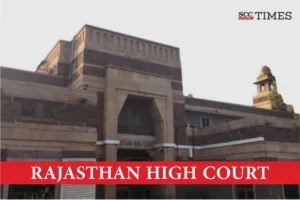Rajasthan High Court: In a petition seeking the quashing of FIR alleging fraud in a long-standing business relationship between the parties, a single-judge bench comprising of Anil Kumar Upman,* J., quashed the FIR and all subsequent proceedings, deeming their continuation as an abuse of the legal process as the FIR primarily stemmed from a commercial relationship gone sour, lacking the essential ingredients of criminal offenses. The Court reaffirmed the principle that criminal proceedings should not be used to settle civil or commercial disputes and emphasised on the importance of maintaining a clear distinction between criminal and civil matters to prevent abuse of the legal system.
Factual Matrix
In the instant matter, the petitioner, Simara Foods Pvt. Ltd., filed a petition under Section 482 of the Criminal Procedure Code, 1973 (CrPC) seeking the quashing of FIR registered at Police Station Banipark, Jaipur (West) by the complainant, alleging offenses under Sections 409, 420, 468, 471, and 120B of the Penal Code, 1860 (IPC). The complainant-respondent alleged that the petitioner induced him into delivering material against advanced payment by raising proforma invoices but failed to deliver the goods or return the advance payment. The complainant also accused the petitioner of making fraudulent entries in the books of accounts and usurping his money.
The petitioner contended that the FIR was based on false and fabricated facts, and it was filed in retaliation to the petitioner’s complaint before the Economic Offence Wing (EOW) in Mumbai. The petitioner argued that even if the allegations were true, they would constitute a civil dispute rather than criminal offenses. On the other hand, the respondent argued that the petitioner fraudulently misappropriated funds and usurped the complainant’s money.
Court’s Observation
Business Relationship and Transactions
The Court examined the long-standing business relationship between the parties and questioned the sudden initiation of criminal proceedings after years of harmonious business dealings. The Court observed that the complainant’s conduct of continuing business transactions with the petitioner for several years despite alleging fraud raised doubts about the credibility of the allegations.
Civil v. Criminal Dispute
The Court noted that the nature of the allegations, primarily involving breach of contract and rendition of accounts, aligns more with civil litigation. The Court noted that the complaint appeared to be a misuse of the criminal justice system to pressure the petitioner in a civil dispute. The Court emphasised that disputes arising from commercial transactions are best resolved through civil litigation and that criminal prosecution should be sparingly used. Referring to precedents, the Court highlighted that criminal proceedings should not be allowed to continue if they arise from a civil or commercial dispute, especially when there is no prima facie case of criminality. The Court noted the growing trend of converting civil disputes into criminal offenses and stressed the need to prevent abuse of the legal system for settling personal scores.
“Need of the hour is to stop the inflow of frivolous criminal cases into the legal system. For this, the police should be advised to conduct preliminary enquiry into the case before filing an F.I.R. Advocates also simultaneously play an important role in preventing criminal frivolous litigation. A good advocate should never condone criminalisation of commercial matters. Courts should bring heavier sanctions against those who try and abuse the judicial system. Concluding, it is important to restore faith of citizens in civil remedies. Steps like speedier resolution of civil disputes, growth of arbitral tribunals, etc should be promoted.”
The Court referred to Paramjeet Batra v. State of Uttarakhand, (2013) 11 SCC 673 and Dalip Kaur v. Jagnar Singh, (2009) 14 SCC 696 where the Supreme Court held that Courts should not hesitate in quashing the criminal proceedings arising from civil or commercial disputes between the two parties. The Court stated that “police stations can/should not be allowed to work as recovery agent or to make pressure upon one party of the litigation in the garb of criminal investigation to settle the civil disputes.”
Advocate’s Role
The Court served as a reminder that advocates must prioritize justice and ethical standards over blind adherence to client instructions. The Court emphasised that the time has come to deprecate the practice of advocates blindly following clients’ instructions, especially when those instructions are unethical or illegal. Advocates are expected to act in the best interests of justice, uphold professional ethics, and provide honest advice, even if it may not align with the client’s desired outcome. The Court noted that both the advocates and Courts need to be more vigilant to ensure justice is served and this responsibility is crucial for maintaining the integrity of the legal profession and the justice system.
“As an advocate serving the Indian judiciary, his primary duty is to represent his clients in court proceedings … Simultaneously he is expected to adhere to high ethical standards and professional conduct. This includes being honest, diligent, and respectful towards the court, opposing counsel, and all parties involved in the legal proceedings.”
Court’s Decision
The Court found that the allegations in the FIR primarily stemmed from a commercial relationship gone sour, lacking the essential ingredients of criminal offenses. The Court, while exercising powers under Section 482 CrPC, quashed the FIR and all subsequent proceedings, deeming their continuation as an abuse of the legal process. The Court emphasised on the importance of distinguishing between civil and criminal liabilities, particularly in commercial disputes, and reinforced the judicial stance against the criminalization of civil wrongs.
[Simara Foods (P) Ltd. v. State of Rajasthan, 2024 SCC OnLine Raj 1143, order dated 10-05-2024]
*Judgment by Justice Anil Kumar Upman
Advocates who appeared in this case:
Mr. Kapil Gupta with Mr. Ajay Gadhwal, Mr. R.S. Sinsinwar, Mr. Chitransh Saxena, Mr. Vipul Ojha, Ms. Anisha Yadav, Ms. Nidhi Sharma, Mr. Dharmendra Bairwa and Mr. Adarsh Singhal, Counsel for the Petitioner
Mr. Mahendra Meena, PP, Mr. Hemant Nahta with Mr. Naresh Sharma, Counsel for the Respondents


